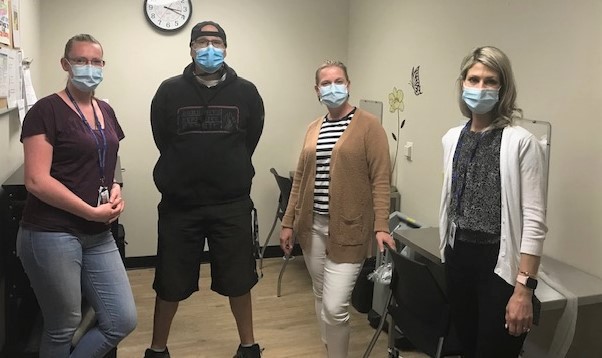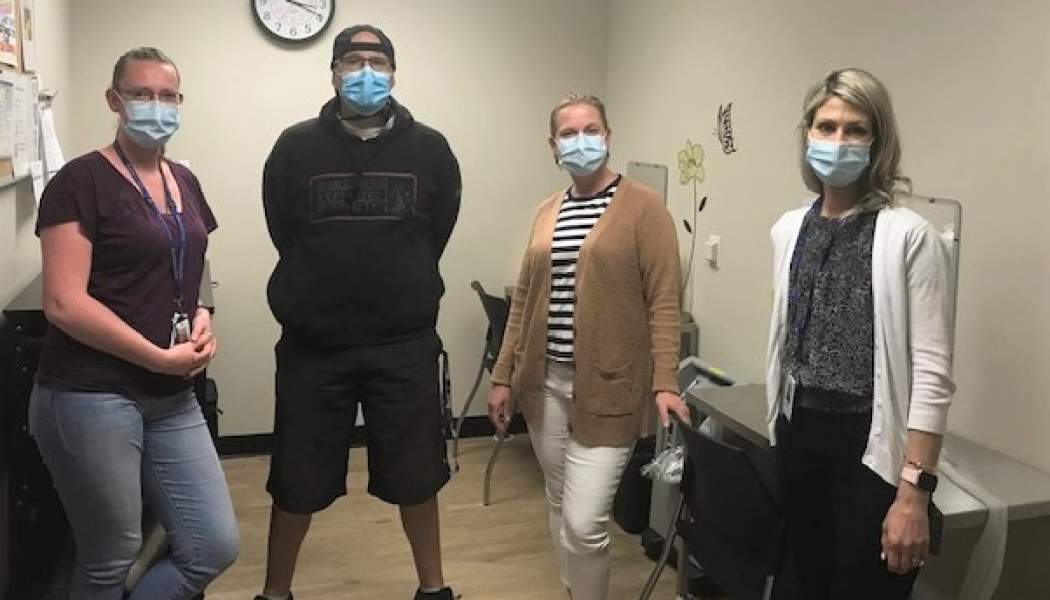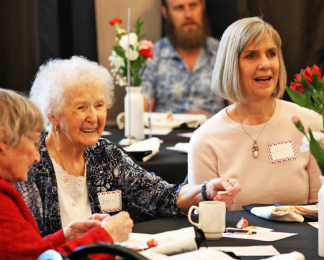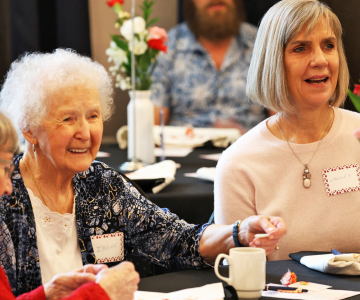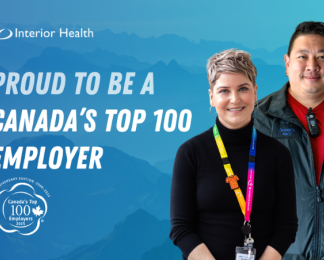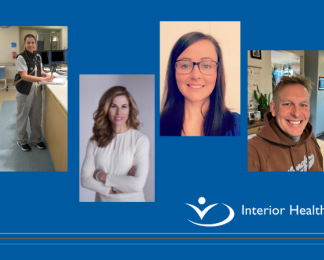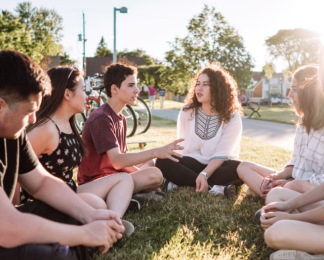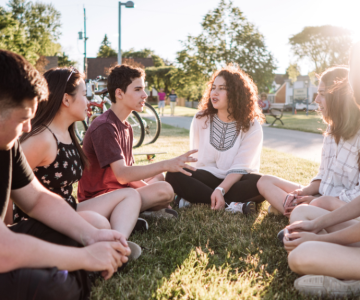In the wake of a deadly rise in drug toxicity and overdoses, the care team at Vernon’s Downtown Mental Health and Substance Use Centre has been quietly saving lives.
An invaluable support for more than 900 Vernon residents, the centre helps with *harm reduction, health services and social supports. Since opening on May 12, 2020, more than 3,500 people have visited, and over 400 drug consumption events have been safely supervised, with zero deaths.
As part of the Vernon care team, Jennifer, Aleasha, and Adrian see the severity of the overdose crisis each day.
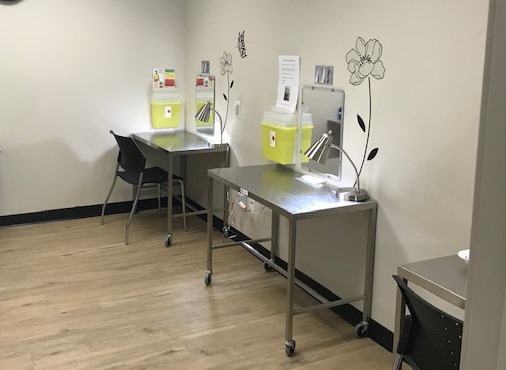
Each month about 30 people visit the centre, where the team helps people use drugs more safely. About 88 per cent of visits are for harm reduction and approximately 11 per cent are for supervised consumption (in March there were 70 consumption visits).
Thanks to tools that make drug use safer such as scales and drug testing, overdose events are not common at the site. Still, staff typically respond to about five each month
A toxic drug supply
The overdose crisis continues. In B.C. last year there were 283 deaths – the highest number ever – and 2021 is tracking to be worse. In Vernon 28 people died last year.
The evidence is clear – street drugs are more toxic than ever and overdose events are increasingly difficult to manage. In addition to fentanyl, many drug samples are now being found with other contaminants, particularly benzodiazepines (benzos), a form of tranquilizer that impacts the nervous system and causes drowsiness or even unconsciousness. The presences of benzos that are made and sold illegally mixed with other substances has rapidly increased from 15 per cent of provincial samples in July 2020 to over 50 per cent in March 2021. Benzos do not respond to Naloxone (a drug which is typically administered to reverse opioid overdose), and can slow or stop a person’s breathing.
While there has never been a reported deaths at an overdose prevention site in B.C., overdose events that are becoming more difficult to manage. Recently, over the course of one week, the Vernon care team provided oxygen three times – something once considered rare.
Connections making a difference
Still the team is optimistic. One of the major influences in the centre’s success is the role of Peers – community members with personal experience and training, who use their own unique knowledge and understanding to help others in whatever way they can.
“It’s really exciting to see that individuals accessing our services are saying ‘this is really valuable, I want to be a part of this. I want to be a part of the solution too,” says Adrian.
The team’s focus on building relationships in the community is working. As one client told them, “You guys have been the light of my day, you have treated us with such dignity and respected, thank you so much for all you do.’’
“We have one client, for example, who had burnt bridges at absolutely every community resource in town, who is now consistently accessing our site. He initially came in for harm reduction supplies, and then started connecting with the overdose prevention nurse, and slowly became more open to talking about his substance use and learning about what services we could offer,” says Jenn.
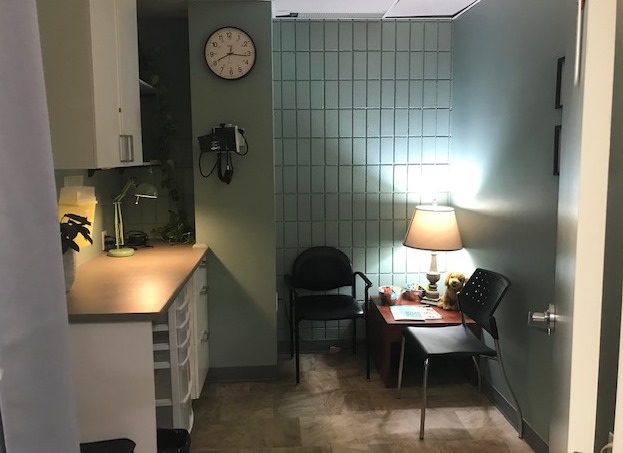
“Finally, because of the trust we were able to establish, we were able to help connect him to **Opioid Agonist Treatment, and he has been able to maintain on that program for several months. Now we’ve seen him become increasingly stable. He’s connected with us and feels quite accepted here. That connection makes all the difference.”
“When you’re in the room with someone who is using the overdose prevention service, it’s quite a long interaction and quite often you end up talking about all manner of subjects, to build relationships with people, and it’s natural for the conversation to cover substance use and harm reduction,” explains Adrian. “You can say ‘oh you were telling me the other day that your leg was hurting, did you want to follow-up on that, we can call primary care and get you in for a look.”
“Our clients are so used to being rejected that they just shut down. In our waiting area we hear so many speak about how grateful they are. They are probably among the most grateful patients in health care.”
The Vernon Downtown Mental Health and Substance Use Centre includes one of four overdose prevention/supervised consumption sites in Interior Health. To learn more check out the supervised consumption services brochure. For help finding substance use treatment and supports visit our Substance Use Services page.
* Harm reduction is an evidence based practice that aims to keep people safe and minimize death, disease, and injury from behavior that involves risk such as substance use and sexual activity.
**Opioid Agonist Treatment is the recommended treatment for Opioid Use Disorder (OUD). OAT involves an opioid agonist medication prescribed and monitored by a health-care provider. The primary medications used are Suboxone and Methadone.
